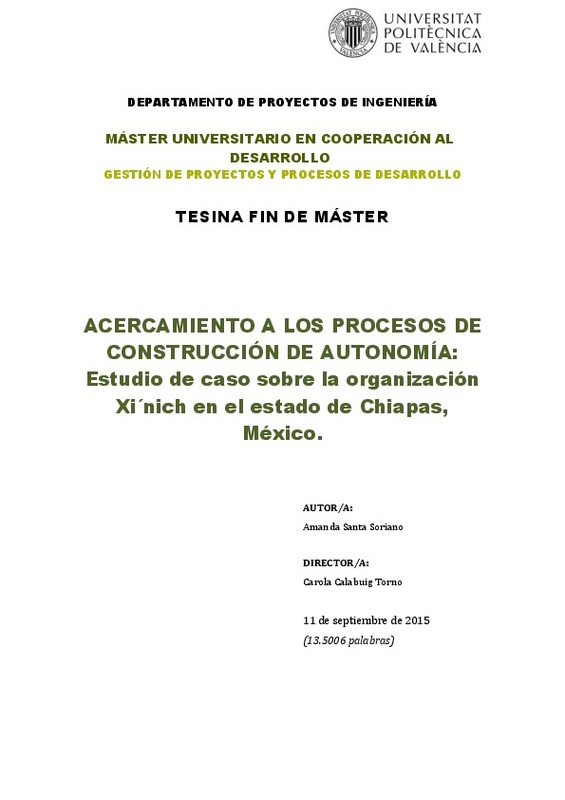|
Resumen:
|
[ES]
El TFM consiste en el análisis crítico del proceso social autónomo de la organización comunitaria Xi'Nich (Comité de Defensa de la Libertad Indígena), conformada por comunidades indígenas de la selva Lacandona en el ...[+]
[ES]
El TFM consiste en el análisis crítico del proceso social autónomo de la organización comunitaria Xi'Nich (Comité de Defensa de la Libertad Indígena), conformada por comunidades indígenas de la selva Lacandona en el norte de Chiapas, México, entre los que se encuentran los familiares y supervivientes de la masacre que sufrieron el 13 de noviembre de 2006 en la comunidad Viejo Velasco. A raíz de investigaciones judiciales realizadas por parte del gobierno mexicano, las comunidades indígenas se están movilizando para construir formas alternativas de justicia que conlleven a crear un nuevo modela de sociedad más justo e igualitario.
Desde un enfoque crítico del desarrollo y abordando la crisis de derechos humanos hacia los pueblos indígenas, se analiza el proceso construcción de autonomía comunitaria, a través del estudio de caso de la organización indígena Xi'Nich, para acercarse a las formas de organización de base comunitaria. El análisis constructivo se enmarca en un análisis más amplio del contexto sociohistórico y político de la zona norte Chapas, en México, en el surgió y creció la organización, sufriendo una represión y violación sistemática a sus derechos desde sus inicios y cuyo momento más crítico fue la masacre perpetrada a su población civil en 2006.
[-]
[EN]
The TFM is in the critical analysis of the social process of autonomous community orfganization Xi'Nich (Committee for the Defense of the Indigenous Freedom), which is composed of indigenous commnunítes of the ...[+]
[EN]
The TFM is in the critical analysis of the social process of autonomous community orfganization Xi'Nich (Committee for the Defense of the Indigenous Freedom), which is composed of indigenous commnunítes of the Lacandon jungle in the north of Chiapas, Mexico, among which are the family members and survivors of the massacre, which suffered on 13 november 2006 in the community Viejo Velasco. As a result of these acts perpetrated, in the face of the grave state of impunity and
negligence that resulted in the judicial investigation conducted by the Mexican government, indigenous communities are mobilizing to construct alternative forms of justice which would lead to create a new model of society more just and egalitarian,
From a critical approach to the devolopment and adddressing the human rights crisis toward the indigenous peoples, he examines the process construction of community empowerment, through the case study of the indigenous organization Xi'Nich, to get closer to the forms of community-based organization. The constructive analysis is part of a broader analysis of the political and soci-hisoric context of the Northern zone of Chiapas, Mexico, in the which emerged and grew the orgnization, suffering a repression and systematic violation fo their rights social since its inception and whose most critical time was the massacre of its civilian population in 2006.
[-]
|







